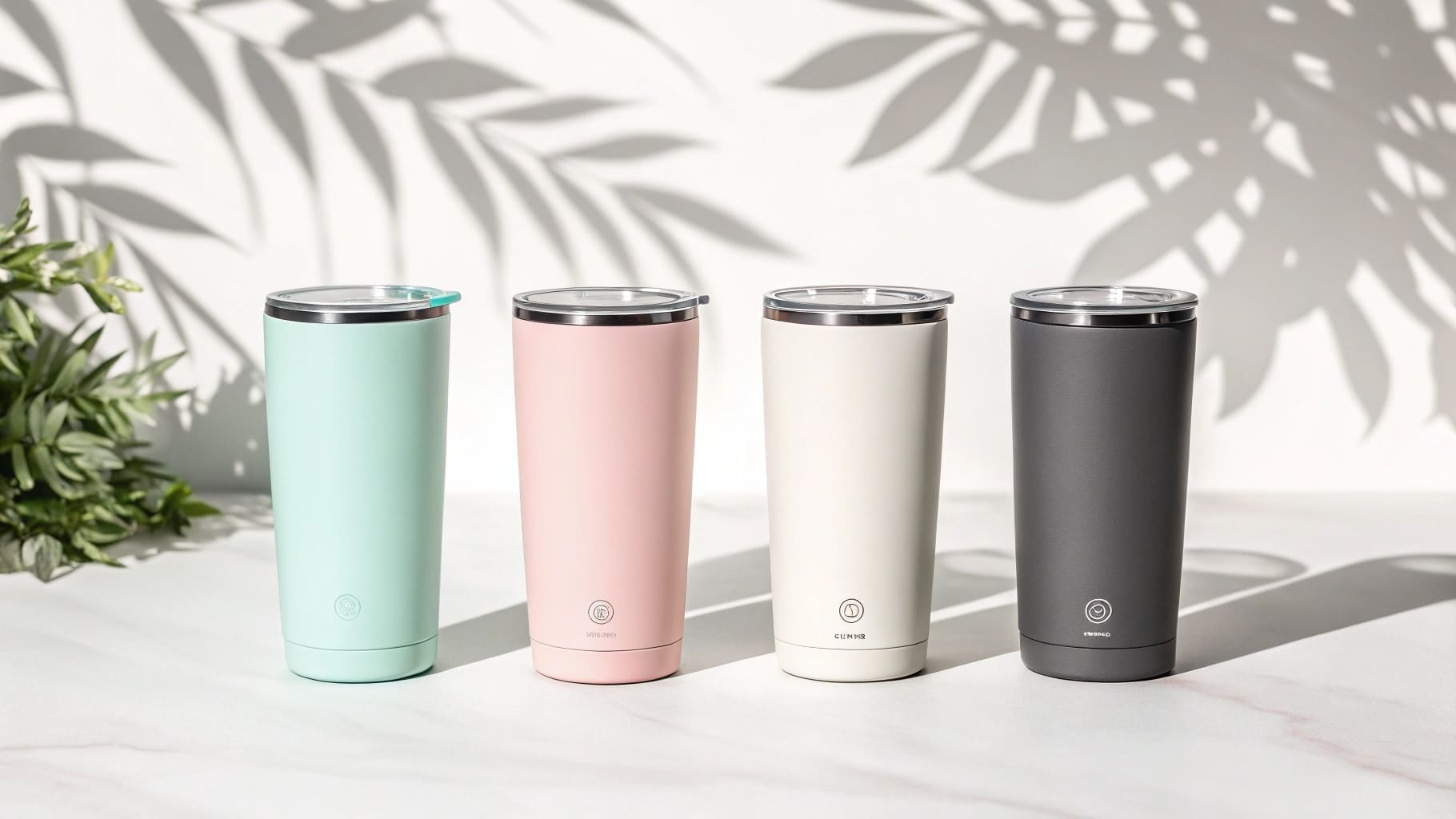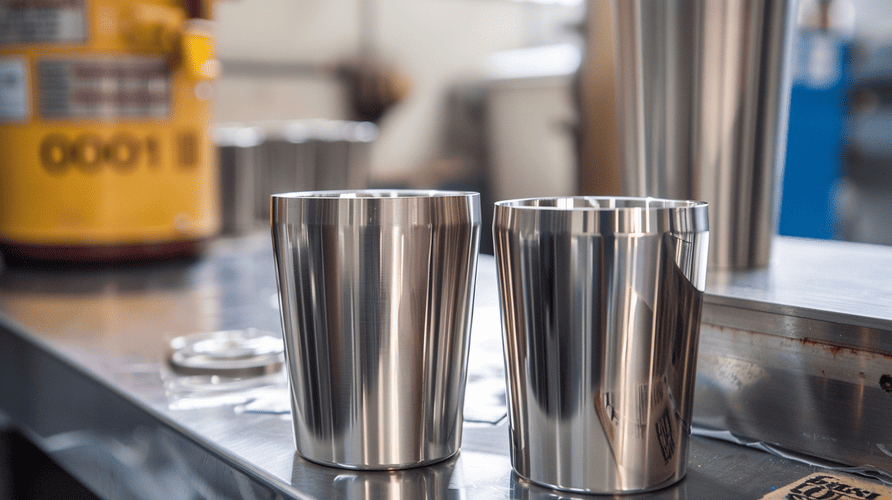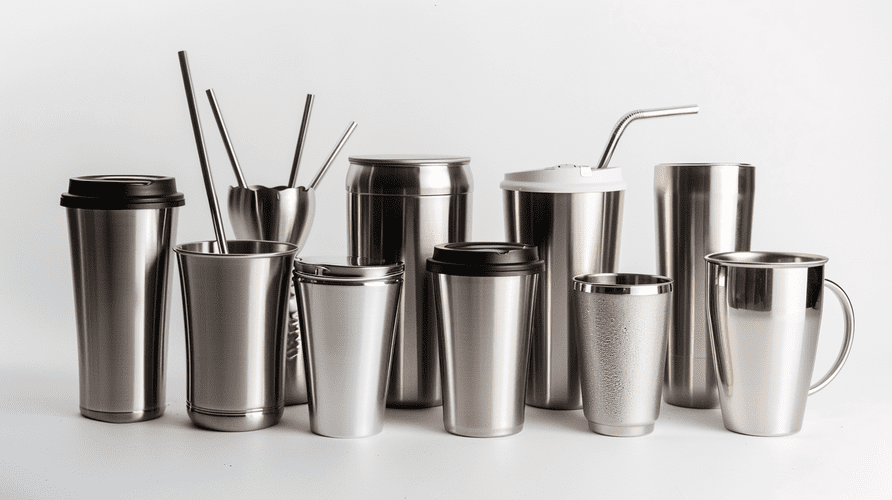Your stainless steel cups look like everyone else's. It's hard to stand out and justify a premium price. You need a way to show your customers the real value.
To differentiate your brand, you must educate your buyers on why your cups are superior. Explain material grades like 304 vs. 316, demonstrate safety with various drinks, and provide clear usage guidelines. This builds trust and proves your premium quality is more than just a label.

I've had many conversations with clients, like Mark from Canada, who have a great product but struggle to communicate its value. Their customers just see another cup. The secret isn't some new marketing trick. It's about turning simple questions into powerful selling points. Let's break down the most common questions I get from B2B buyers. I'll show you how to answer them in a way that builds your brand and closes the deal.
How Can You Tell If a Cup Is Stainless Steel?
A buyer questions your cup's material. You say it is stainless steel, but they need proof. Doubt can kill a deal, so you need to provide a confident answer.
The easiest way is to use a magnet. High-quality austenitic stainless steel, like 18/8 (304), is generally non-magnetic. Also, look for markings like "18/8" or "304" on the bottom of the cup. These marks indicate the grade of food-safe stainless steel used.

Beyond the magnet test, the most reliable proof is in the documentation. As a manufacturer, I provide material specification sheets and test reports for every batch. This is your ultimate guarantee. The markings on the cup, like "18/8" or "SS304," tell you the grade. "18/8" means it contains 18% chromium and 8% nickel, which gives it excellent rust resistance. This is the standard for high-quality, food-grade drinkware. Cheaper cups might use lower-grade steel, like 201, which looks similar but is more prone to rust over time. When a buyer asks this question, they're really asking, "Can I trust your quality?" Answering with specifics and offering certification shows that you can.
| Feature | 304 (18/8) Stainless Steel | 201 Stainless Steel |
|---|---|---|
| Corrosion Resistance | Excellent | Fair |
| Composition | 18% Chromium, 8% Nickel | 16-18% Chromium, 3.5-5.5% Nickel |
| Food-Grade | Yes, global standard | Yes, but less durable |
| Cost | Higher | Lower |
Can You Put Boiling Water in a Stainless Steel Cup?
Customers worry about safety. They ask if boiling water will damage the cup or leach harmful chemicals. A hesitant "yes" sounds uncertain and can stop a bulk order cold.
Absolutely. High-quality stainless steel, like food-grade 304, is designed to handle extreme temperatures without warping, breaking, or leaching chemicals. It is a completely safe material for boiling water. With double-walled cups, the exterior even remains cool to the touch for safe handling.

The science here is simple. The melting point of 304 stainless steel is around 1400°C (2550°F), so boiling water at 100°C (212°F) is not a problem. The material is incredibly stable. The key difference for the user is in the construction. A single-wall cup will get very hot on the outside, making it difficult to hold. A double-wall vacuum-insulated cup, however, is the premium choice. The vacuum layer prevents heat from transferring to the outer wall, so the outside stays at room temperature while the water inside stays boiling hot for hours. This is a major selling point. When you explain this, you're not just confirming safety; you're demonstrating the superior engineering and user experience of a premium insulated cup. It highlights a feature your customer can market to their own audience.
Can I Put Coffee in a Stainless Steel Cup?
Coffee lovers are picky. They worry a metal cup will ruin the taste of their favorite brew. If they think your cup gives coffee a metallic aftertaste, they will not buy it.
Yes, you can. Food-grade 18/8 (304) stainless steel is non-reactive and will not affect the taste of coffee. For the ultimate experience, consider 316 (medical-grade) stainless steel. It offers even better corrosion resistance, ensuring absolutely no metallic taste, even with acidic drinks.

This question is a perfect opportunity to introduce a premium upgrade. Coffee is acidic, and over a very long time, this acidity can interact with lower-quality metals. While standard 304 stainless steel is excellent and widely used, offering 316 stainless steel as an option sets your brand apart. 316 grade contains molybdenum, an element that significantly boosts corrosion resistance, especially against acids and chlorides. This is why it's called "medical-grade." For a brand that targets coffee connoisseurs, being able to say "our cups use 316 stainless steel to guarantee the purest taste" is a powerful differentiator. I always explain this choice to my clients. It allows them to create a "good, better, best" product line and truly cater to a high-end market.
| Feature | 304 Stainless Steel | 316 Stainless Steel |
|---|---|---|
| Best For | General use, water, tea | Acidic drinks like coffee, juice |
| Corrosion Resistance | Excellent | Superior |
| Key Additive | None | Molybdenum |
| Positioning | Premium Standard | Ultimate Purity |
Can I Put Tea in a Stainless Steel Cup?
Tea drinkers are concerned about staining and flavor retention. Will their cup end up tasting like yesterday's Earl Grey? A stained, smelly cup is a poor advertisement for a premium brand.
Yes, stainless steel is great for tea. Unlike plastic, it's non-porous and resists staining and odor retention. A quick rinse is usually enough to clean it. For brands focused on tea, an electropolished interior provides an even smoother surface, making cleaning effortless.

Tea contains tannins, which are notorious for staining porous materials like plastic or even some ceramics over time. High-quality stainless steel does not have this problem because its surface is non-porous. Flavors and colors can't soak in. You can take this a step further by offering an electropolished interior. Electropolishing is an electrochemical process that removes a microscopic layer of the steel's surface. This makes it incredibly smooth and even more resistant to residue buildup. After a quick rinse, there's no lingering taste of the previous tea. When you explain this to a buyer, you're showing them a tangible feature that solves a real problem for tea lovers. It's a small detail that screams "premium quality" and justifies a higher price point because it provides a better, cleaner drinking experience.
Can You Microwave Stainless Steel Cups?
A customer asks if they can microwave your cup. A simple "no" can sound unhelpful. A wrong answer here is a huge safety liability that could damage property or cause injury.
No, you must never put any stainless steel cup in a microwave. Metal reflects microwaves, which can cause sparks, damage the appliance, and create a serious fire hazard. This is a fundamental safety rule for all metal cookware. Always heat liquids separately before pouring.

Your role as a premium supplier includes educating your buyers on safe usage. This isn't a flaw in the product; it's physics. Microwaves work by passing energy through food and liquid to excite water molecules. Solid metal blocks this energy. The reflected energy has nowhere to go, so it creates electrical arcs—sparks—between the metal and the microwave's components. This can permanently damage the microwave's magnetron or even start a fire. I always stress this point with my clients. By giving a clear "no" followed by a simple explanation, you build trust. You show that you care about their safety and their customers' safety. You can also offer a helpful tip: "To reheat your drink, simply pour it into a microwave-safe mug, heat it, and then pour it back into your insulated cup to keep it hot for hours." This turns a limitation into helpful, responsible advice.
Conclusion
Differentiating your brand isn't about shouting louder. It's about answering smarter. Use every question to prove your quality, build trust, and become a valued partner, not just a supplier.

